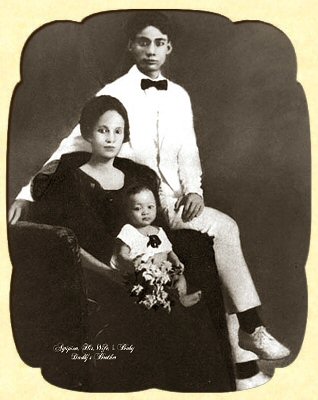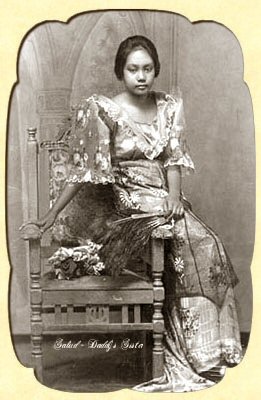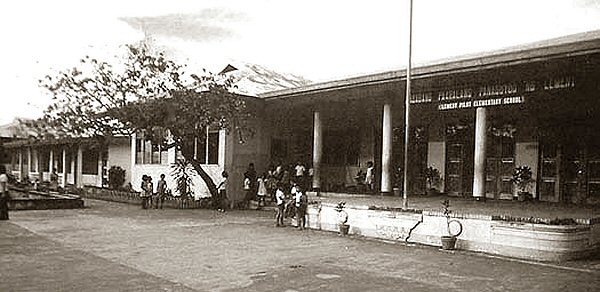Chapter 3
A FAMILY DIVIDED

Shortly after Father's death, my younger sister Salud and my brother, Fernando, went to live with my step aunt Vincenta. She and her husband and their three children lived on the neighboring island of Mindoro. Mother would never see Salud and Fernando again. I was not to see them again for ten years or so when I was almost grown.
Father had many relatives on his mother's side, the Solis family. His father's side of the family, the Reyes, were prominent in the social and economic life of Taal and Lemery. There were priests, doctors, and lawyers on both sides of his family. I had heard stories told of my father's active part in the revolution against the Spanish sovereignty in the 1890's.
On my mother's side, I knew only two families related to her with the exception of her "Mother" whom we called Nanang, meaning Grandma. This situation would be explained to me by Grandma Modesta on my visit to Mindoro in 1921.
Siblings of Felipe Morales Reyes - Click each photo to enlarge.

Felipe's brother Agripino Reyes
with his wife and baby.
|

Felipe's sister Salud Reyes.
|
Not long after Salud and Fernando left for Mindoro, Agripino went to live with one of Father's cousins, a pharmacist, who lived in the province of Tayabas, about a half a day's trip by caromata and train from Taal. This left Juaquina, baby Maria, and me to live with Mother. Grandma Modesta and our step grandfather went to live with my aunt in Mindoro. Mother, Juaquina, the baby, and I moved out of our large home to live in Grandma Modesta's house. Mother became sick, never to be well again.
Juaquina, now 15, was soon married to a neighbor's son. Baby Maria was taken by one of Father's aunts in Lemery, Nanang Aguida. I was the only one left to live with Mother. I started my schooling at this time. I must have been around six years old.

Taal School
Soon, Mother was not able to care for me and I left to live with Nanang Aguida, Father's aunt in Lemery who was caring for Maria. I had to transfer from my school in Taal to the one in Lemery.
Mother was selling her possessions in order to have money to live. Soon, she had sold all her valuables, such as jewelry and furniture. I found out later that the house we had lived in belonged to my Father's uncle and it had been sold when we moved to Grandma's house. Our land had been sold before Father died to defray his medical expenses and for Mother's keep. Left without any funds whatsoever, Mother had to live with her friends and her only two relatives.
My life at Nanang Aguida's with my sister, Maria, was a happy one. Nanang Aguida, sister of my paternal grandfather, was reputed to be a wealthy widow. Her niece by marriage, whose husband was to become the mayor of Lemery, and their three children lived there with us. Mother visited us when she was able. I was making good grades in school. I took my First Communion and passed Catechism with flying colors.
When I was ten years old and in the third grade, Nanang Aguida told me that Mother was very sick and I would have to quit school to take care of her. Mother was living in a back room at one of Father's Reyes relatives and I moved into this room with her. We lived in the back room much to ourselves but ate with the family. With their limited means, they tried their best to supply Mother's medical needs.
Juaquina had two children of her own by now and was not able to care for Mother. I went to Nanang Aguida's often and she would give me money for Mother before I left.
Mother woke me one night and told me to get a basin of water and a towel. She was vomiting blood profusely. I knew she was very sick and suffering but she would not let me wake her cousin. She told me not to make any noise so that the other occupants of the house would not wake up. I believe she wanted to hide her worsening condition from them.
Sometime later, Mother told me to ask Nanang Aguida to come see her; and she did, bringing Maria with her. Mother cried most of the time she was talking to Nanang. When Nanang left, Mother told me that we would move to an empty building not far from Nanang Aguida, who would engage an elderly woman to help me take care of Mother.
The building we moved into was the largest building in Lemery. It had been unoccupied for as long as I could remember. I don't know who it belonged to. To give one an idea how large that building was, it was used for constabulary quarters for an entire company after we moved out. In times past, it had served as a city hall, then as a schoolhouse, until a new town hall and a new primary school were built. Many people shied away from this house. Children were afraid to play near it at night, as it was reputed to be haunted. This would be Mother's and my new home.
We occupied a ground floor room where a make shift stove was placed for us to cook our simple meals. Mother was becoming progressively worse and Juaquina, even though burdened with her own two children and her husband's meager income, decided to help.
She moved us to an empty house across the street from hers. Here we did not have any furniture. Mother's bed was a native mat on the floor. We lived with the barest of necessities. The lady engaged by Nanang Aguida moved in with us and stayed until Mother died. Only Nanang Aguida helped us. God bless her! None of Father's other relatives even visited us. Life was better in this last house because we were near my sister who helped by bringing food often. When she was not busy with her own family chores, Juaquina stayed with Mother.
During Mother's last days, I think she lost her mind entirely. She would call for the other children just as though they were within earshot. When she called for her children, Juaquina and I wept. We did not know where Agripino was, and Salud and Fernando were out of reach on Mindoro Island.
Mother could not even sit up anymore but I noticed her fingering her prayer beads and I knew she was praying. I believe she prayed constantly when her mind was clear and not wandering. One can only imagine how a boy of my age felt. My mother was dying in the poorest of conditions and I was alone much of the time. I would sadly recall the happy home life we had when Father was living.
This was the saddest part of my entire life and even now, as I write this, I cannot control my emotions.
One afternoon, about one, Mother called me and said she wanted to have some "suman", a native rice delicacy (a popular Filipino rice cake wrapped in banana leaves and cooked). A few centavos would buy more than she could eat as she had lost her appetite, but we did not have any money. I went to one of her friends and told her my predicament, and she gave me a few centavos to buy one or two suman.
When I returned home, I heard Juaquina weeping. When I entered the house, I was told by the old lady that Mother had died shortly after I left to beg for her needs. The suman remained uneaten and I know that Mother died hungry. This has grieved me all my life.
Word must have been sent to Nanang Aguida, as she came into the house shortly after I did. She and my sister talked about the funeral arrangements and we held the funeral that afternoon.
Mother had the poorest and simplest of funerals in the Philippines. I can remember there being only a few people in the funeral party: Nanang Aguida, my sister and brother in law, the old lady, and the two men who carried the simple and primitive coffin made of bamboo slats in which Mother was buried. Only a Filipino in the rural areas will understand the descriptive words of "poorest and simplest" I use in describing Mother's funeral when she was buried in a bamboo slat coffin. Only the extremely poor and destitute were buried in such a fashion. I doubt if this is still done in the modern Philippines.
Continue to next chapter...

(Introduction)
(Contents)
(Chap 1)
(Chap 2)
(Chap 3)
(Chap 4)
(Chap 5)
(Chap 6)
(Chap 7)
(Chap 8)
(Chap 9)
(Chap 10)
(Chap 11)
(Chap 12)
(Chap 13)
(Chap 14)
(Chap 15)
(Chap 16)
(Chap 17)
(Chap 18)
(Chap 19)
(Chap 20)
(Chap 21)
(Chap 22)
(Chap 23)
(Chap 24)
(Chap 25)
(Chap 26)
(Chap 27)
(Chap 28)

|